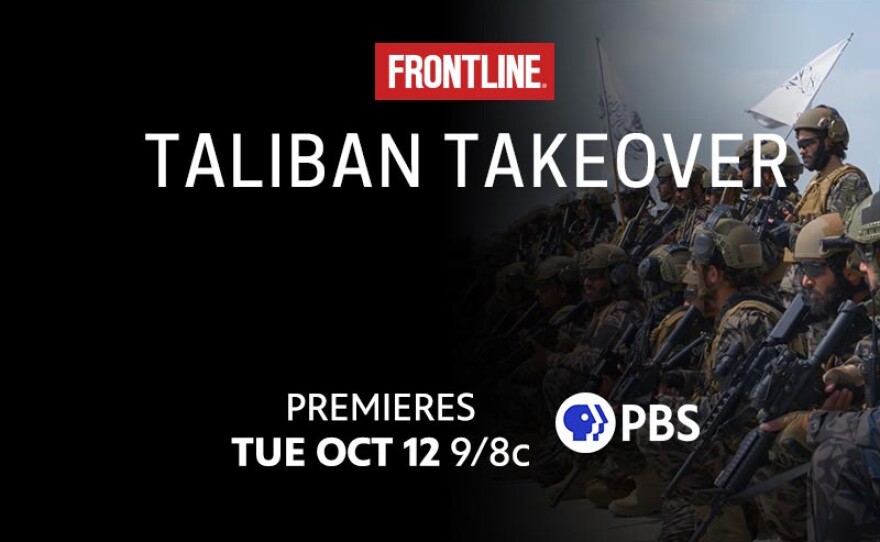Premieres Tuesday, Oct. 12, 2021 at 10 p.m. on KPBS TV + Thursday, Oct. 14 at 10 p.m. on KPBS 2 / On Demand
Filmed on the ground in Afghanistan in the wake of the U.S. withdrawal and the Taliban’s return to power, a stunning new FRONTLINE documentary reveals just how rapidly the hardline group’s takeover has transformed daily life in Afghanistan — especially for women and ethnic minorities.
In scene after extraordinary scene from "Taliban Takeover," Peabody Award-winning correspondent Najibullah Quraishi, who was born and raised in Afghanistan and has covered the war there for two decades, documents the Taliban’s crackdown in real time.
“Despite the Taliban’s claims that it has changed, what I’ve seen in the early days of the new Taliban regime in Afghanistan looks a lot like the harsh and brutal Taliban of the 1990s,” Quraishi says.
Quraishi’s team films in Kabul as men who say they’re working undercover for the Taliban force women at a restaurant to leave; as a university student describes being whipped by the Taliban; and as leading women’s rights activist Mahbouba Seraj finds herself unable to help a visitor who says her granddaughter may have been abducted by the Taliban.
“This is not the time to be sad, this is the time to be angry,” says Seraj, one of TIME Magazine’s 100 most influential people of 2021. At the same time, she tells Quraishi, she fears, “There’s nothing I can do.”
And Quraishi speaks with journalist Ishaq Akrami, who describes an event in which 13 people — members of the Shia Muslim group the Hazaras, an ethnic minority who have long been the subject of Taliban attacks — were killed. This, despite the Taliban’s assertions that it had changed.
“After the Taliban declared national amnesty and indicated that they would not harm politicians, security forces, journalists, etc., they informed these people as well to come and surrender their weapons and that they would not be harmed,” Akrami says. “They came back from the mountains and surrendered their weapons to the Taliban. The Taliban then started shooting them.”
Drawing on Quraishi’s remarkable on-the-ground reporting going all the way back to 2001, the film is a defining look at what led up to the U.S. defeat in Afghanistan — and how the Taliban’s return to power is playing out.
Though the Taliban was eager to project a new, more moderate image in the days just after the American withdrawal, Quraishi found signs of the same extremism that characterized their rule 20 years ago — including in what happened when women took to the streets of Kabul to demand that their rights be respected.
“They whipped women when we were demonstrating. They fired their guns into the air to scare us,” says a young protester, Wahiza. “We want our rights. They must respect our rights. We need to be able to study and work.”
Before the U.S.-led invasion in 2001, the Taliban imposed a harsh interpretation of Islamic law. Girls were not allowed to attend school. Women were extremely limited in their ability to work, and their movements and appearance were strictly policed. Harsh punishments were meted out to both men and women accused of violating the group’s rules.
Zabiullah Mujahid, the Taliban’s spokesman, told Quraishi before the Americans left that the group was no longer the Taliban of the 1990s: “We want the same Islamic rules to be in our society, but instead of forcing people by stick and lashes, we will do so through the mosques and sermons,” he said. “Using these ways, we think it might take longer, but it will come very smoothly and without causing any harm or disturbance.”
But what Quraishi finds suggest otherwise. In one case, Quraishi speaks with a college student who says he was stopped by the group’s police on his way home and beaten: “The whip was rubber, and it left behind stripe marks.”
In addition to documenting the Taliban’s crackdown, Quraishi investigates how the Taliban’s rise is intensifying the threat from Al Qaeda and ISIS — both within the country, and potentially for the rest of the world. A longtime source tells Quraishi that the Taliban is once again providing Al Qaeda safe haven: “I don’t think the Taliban will end their relations with Al Qaeda any time soon,” the source says. Additionally, he says, ISIS “is a very serious danger, not just for Afghanistan but for the whole world.”
"Taliban Takeover" draws on both Quraishi’s new reporting and his coverage of Afghanistan since 2001, when he was injured documenting a bloody uprising against coalition forces. He continued to document the Taliban’s pursuit of a return to power — and Al Qaeda’s reconstitution — in films including 2010’s "Behind Taliban Lines." Then, he uncovered a new threat, exposing the Islamic State’s presence in the country in 2015’s "ISIS in Afghanistan." In last year’s "Taliban Country," Quraishi reported that not only was the Taliban once again wielding power in Afghanistan, but the threat from ISIS continued to loom large. This summer, in "Leaving Afghanistan," he documented the Taliban’s rise and showed how the U.S. withdrawal was paving the way for increased sectarian violence, with the country’s Hazara minority under threat.
Now, with Clover Films producer Jamie Doran, Quraishi delivers a look at just how quickly that prediction is coming true, and how the situation in the country reached this point.
Watch On Your Schedule:
FRONTLINE "Taliban Takeover" premieres Tuesday, Oct. 12, 2021, and will be available to watch in full at pbs.org/frontline and in the PBS Video App starting that night at 7/6c and on YouTube at 9/8c.
Join The Conversation:
FRONTLINE is on Facebook, Instagram, tumblr, and you can follow @frontlinepbs on Twitter. #frontlinePBS
Credits:
A FRONTLINE production with Clover Films. The correspondent is Najibullah Quraishi. The producer is Jamie Doran. The senior producers are James Jacoby and Molly Knight Raskin. The executive producer for Clover Films is Jamie Doran. The executive producer for FRONTLINE is Raney Aronson-Rath.





